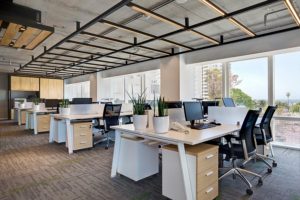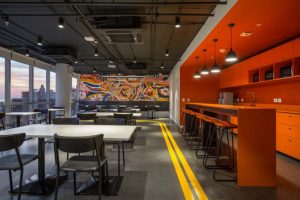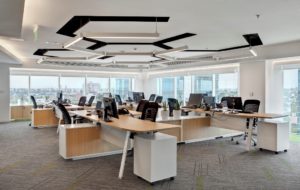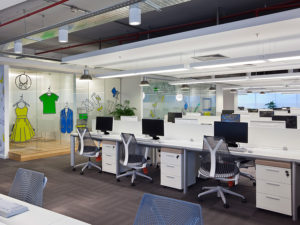In 1996 Contract Workplaces was founded in Argentina, with the spirit of becoming the only company specialized in the design and construction of workspaces in the region. In 2011, and as part of its regional expansion plan, it expanded its operations to Uruguay, settling in the country’s capital. Today the company has two of its own offices in Montevideo: one in Tower 4 of the World Trade Center and the other in the WTC Free Zone.
Paradoxically for a company in this field, the beginnings of the operation were in the garage of an office building! “Our initial growth was so fast that we had to incorporate new collaborators and, between the uncertainty of all kick-offs and the immediate lack of space, we got that place and a few pieces of furniture on loan. After a while, we were able to rent an office in the same building, get out of the ground, and design and build our first office,” says architect Daniel Flom, founding partner and Executive Director of Contract Workplaces Uruguay.
A glance of his work in Uruguay
The first two commissions in Uruguay were for leading multinational companies in their fields: agribusiness and coworking. Those first successful projects were followed by many more. “From our beginnings, one of our main differentials has been to fulfill the commitments assumed with our clients: works on time, on budget and with the agreed quality. This allowed us to quickly generate close ties with the organizations we work with, who recommend us and request our services again”, adds Rafael Flom, economist and also founding partner and Director of the company.
The wide coverage of services and specialization in the latest trends in workspaces were the pillars that led Contract Workplaces to position itself as leaders in corporate architecture in Latin America, and Uruguay is no exception. “Other keys to success are undoubtedly the determination of a high-performance team, the trust of our customers and that of our suppliers. Architecture and construction in general, but work at Contract Workplaces in particular, are strongly teamwork. Achievements and failures are always shared, ”adds architect Flom.
Today, it has 10 years of experience in the country and more than 200 works carried out for various industries that exceed 60,000 square meters designed and built, positively impacting the work experience of more than 10,000 people. Some of the projects executed in recent years were for clients such as WPP, Mercado Libre, Oracle, Fucac, Starcenter, Deloitte, World Trade Center, Bayer, Mapfre, Pfizer, among others.
A look into the future of work
We are in the midst of a huge transformation in the way we work. The COVID-19 pandemic has not only accelerated trends that were emerging but would have taken years to reach mass adoption; people’s vision of the future has also changed. So what is the future of the office in the new post-pandemic normal?
Many analysts believe that the world of work will change, but that, in essence, it will not be that different from how it was before the pandemic; human beings are social beings, we need contact and social interaction. In this sense, the office can – and must – become a positive experience and a desirable destination for workers. The work environment will strengthen its role as a management tool to create culture, generate a sense of belonging and purpose. It will be the necessary framework for innovation, serendipity, learning and the creation of bonds of trust between the members of an organization.
Traditionally, the office was thought of as a place to group people behind a desk within a fixed schedule, where experiences used to happen without much planning or control but as a result of everyday activities. Today, by contrast, the economy and technology have transformed workers into a workforce of mobile consumers, so the workplace experience is becoming a vitally important issue that deserves to be designed and managed with much detail. All elements of the environment (physical, virtual and social) are carefully articulated to inspire and engage employees. Each interaction is painstakingly designed to create deep emotional connections.
Also, models such as ABW (activity-based work) acquire greater value due to their flexibility and great adaptability to the needs of a world that will continue to change more and more rapidly. This will allow the offices to function as hubs for face-to-face collaboration while sustaining digital cooperation. Technology will play a central role in blurring the boundaries between the physical and virtual world and in preserving corporate culture.
“Faced with this new reality, the commitment of Contract Workplaces – more than ever – is to accompany clients in the process of conceiving and defining their new work models, probably hybrids, and the activities that will be supported there,” says Daniel Flom.
Contract Workplaces affirms its local positioning and is committed to continuing to create innovative work experiences that promote the development of companies and their collaborators, enhancing their talent.



